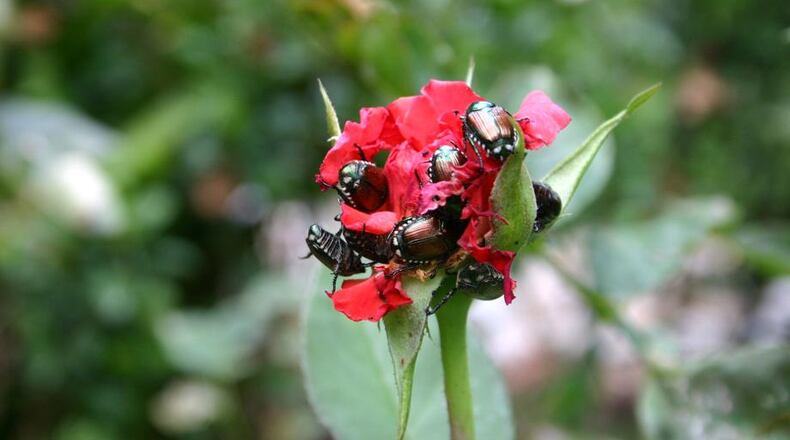>> 12 top hiking trails in Dayton and nearby
"They are a constant worry because they just eat and eat and eat," she said of bug with the copper-brown colored wing covers.
Accidentally imported from Japan in the 1900s via New Jersey (thanks a lot!?!), Japanese beetles can wreck farm crops and are a nuisance to home gardeners.
The pests are particularly fond of roses (especially the ones you really, really love), but can prey on 300 species of plants, according to the University of Kentucky's college of agriculture, food and environment.
“We don’t have enough predators to eat them,” she said.
Credit: Photo: Betty Hoevel
Credit: Photo: Betty Hoevel
Small birds cannot eat their hard metallic, blue-green bodies.
Natural predators like those found in Japan have not been able to be acquired in large enough numbers to control them here, Hoevel said.
"Sometimes it looks like the Wegerzyn rose bushes are glowing (due to a feeding frenzy)," she added.
The vein in your forehead might be twitching due to frustration, but Hoevel said the beetles are having a banner year.
“They are as bad as they have ever been,” she said. “It is not a light year.”
>> The story behind North Dayton Garden Center’s legendary jingle
The good news is they will be gone in a few weeks, as they live 30 to 50 days, she said.
The bad news is that they aren’t gone yet and the females have been laying eggs — about 50 each — that will grow into grubs that eat root systems in the spring.
“Literally, they just eat all the roots and the organic material they can find,” she said.
They start emerging in June and devouring as much as they can.
The females are the worst.
Besides producing new beetles, Hoevel says they are big eaters and send out pheromones that can be left on your prized plants.
Credit: Photo: Betty Hoevel
Credit: Photo: Betty Hoevel
>> MORE: Popular UD bar is literally about to ‘go solar
The dinner bell in the form of pheromones explains why you often find Japanese beetles clustered together and chomping one flower.
“They eat until they are done. Screaming doesn’t help. I’ve tried that, Hoevel said, only half joking. “Threatening them with a dog does not help.”
Neem oil and other sprays can be effective, but only go so far.
“It is only going to effect the beetle that it (the spray) hits,” she said.
Drowning beetles you come across in a bucket or container containing soapy water is often the only defense a rose lover has, but Hoevel said there are other options like using your feet.
“I am a firm believer that if you don’t have your soapy water, you can step on them,” she said.
>> MORE: How to “be green” in Dayton
Credit: Photo: Betty Hoevel
Credit: Photo: Betty Hoevel
About the Author



